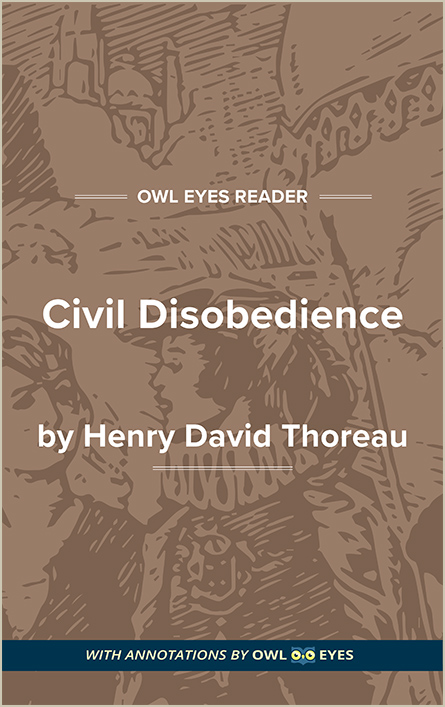Study Guide
Analysis Pages
Summary
The long autobiographical essay most commonly known as “Civil Disobedience” was first published as “Resistance to Civil Government” in the magazine Æsthetic Papers in 1849. The essay appeared under its common title in A Yankee in Canada, with Anti-slavery and Reform Papers (1866), a collection of his works. The essay grew out of a series of lectures, “The Rights and Duties of the Individual in Relation to Government,” which Thoreau delivered to the Concord Lyceum in 1848.
Two years before the Lyceum lectures, in midsummer 1846, Thoreau spent a night in jail because he had refused to pay six years of delinquent poll taxes. He argued that he could not pay funds that helped to support the U.S. government’s war with Mexico, nor could he pay a government that still accepted slavery in its Southern states. Thoreau regarded the war as unjust and staunchly opposed slavery. Over his protests, one of his relatives paid his taxes, and Thoreau was released.
Thoreau’s short stay behind bars helped inspire his great political essay. In it, he begins with an assertion of the desirability of limited government, subject to not only democratic will but also the conscience of the individual. The opening statement, “I heartily accept the motto, ’that government is best which governs least,’” establishes Thoreau as highly skeptical of political authority. He extends the criticisms of standing armies, which were often identified as instruments of tyranny in early American political thinking, to government itself, and argues that government is often an instrument of abuse against the people. Still, although Thoreau may be a philosophical anarchist, he specifically states that having no government at all will be practicable only when the people are prepared for such a situation, and he implies that, in his own day, they are not prepared. Nevertheless, he maintains that government is only an instrument through which people act, and that it should leave people alone as much as possible.
The laws passed by government, according to Thoreau, are only reflections of people, and he expresses no regard for law simply because it expresses the will or acceptance of a majority. Laws and government may be improved when they come from conscience, not when conscience follows laws or government. He asserts that the U.S. government does not merit his support because of the war on Mexico and the existence of slavery in the South. Given Thoreau’s view of government, he does not believe that these injustices can be righted by the democratic means of voting, since voting simply expresses the acceptance of the will of a majority, not a dedication to the dictates of one’s own conscience.
The commitment to justice does not mean that Thoreau believes he has an obligation to right the wrongs of the world. In fact, he explicitly states that no one has the duty to eradicate even the greatest of wrongs. He says that he was born to live in the world, not to make it a better place to live. However, he also claims that the wrongs of the world continue to exist because people are willing to support them. His obligation is to refuse to be a party to the wrongdoing, and not to participate in political procedures for change. Thoreau’s essay, then, argues not for disobedience as a strategy of political engagement, but as an act of moral disengagement from politics.
Thoreau’s disengagement should not be confused with inaction, though. Instead, it is a type of face-to-face action. When the conscientious person meets the agent of the state, in the form of the tax collector, that person can refuse to be a party to wrongdoing by refusing to pay taxes. Furthermore, the objector should recommend that the tax collector resign the official position and also refuse allegiance to the state. If the government imprisons the objector or confiscates property as a response, then that government, which is engaged in immoral actions, simply reaffirms the moral position of the...
(The entire page is 1,234 words.)
Owl Eyes subscribers get unlimited access to our expert annotations, analyses, and study guides on your favorite texts. Master the classics for less than $5/month!

